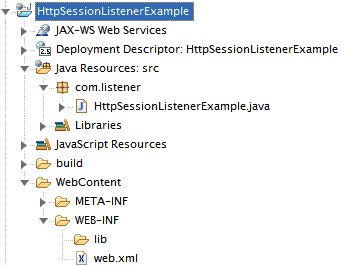HttpSessionListener Example

HttpSessionListener Example explains about How to use HttpSessionListener in a web application
What is HttpSessionListener?
For knowing about HttpSessionListener, First we must understand session. Http protocol is a "stateless" protocol. The word stateless means Http protocol can't persist the information in between client and server. When a client sends a request for any resource, server receive the request and process the request and returns response. After returning the response the server terminates the connection. When a client forwards a request for a particular resource, server consider each and every request as a separate request. In order to avoid this burden we use session. With the help of session tracking when a client request for any pages or resources container creates a session id for that particular request and return back the session id to the client along with the response object.
When I Use HttpSessionListener
Whenever a session created or destroyed, servlet container will invoke HttpSessionListener
javax.servlet.http.HttpSessionListener interface has following methods:
sessionCreated(HttpSessionEvent event) It will notify when the session is created. sessionDestroyed(HttpSessionEvent event) It will notify when the session gets invalidated.
Package Structure

web.xml
<?xml version="1.0" encoding="UTF-8"?> <web-app xmlns:xsi="http://www.w3.org/2001/XMLSchema-instance" xmlns="http://java.sun.com/xml/ns/javaee" xmlns:web="http://java.sun.com/xml/ns/javaee/web-app_2_5.xsd" xsi:schemaLocation="http://java.sun.com/xml/ns/javaee http://java.sun.com/xml/ns/javaee/web-app_2_5.xsd" version="2.5"> <listener> <listener-class>com.listener.HttpSessionListenerExample</listener-class> </listener> </web-app>
HttpSessionListenerExample.java
import javax.servlet.http.HttpSessionEvent;
import javax.servlet.http.HttpSessionListener;
public class HttpSessionListenerExample implements HttpSessionListener {
private static int sessions;
public static int getTotalActiveSession() {
return sessions;
}
@Override
public void sessionCreated(HttpSessionEvent arg) {
sessions++;
System.out.println("sessionCreated add one session into counter");
}
@Override
public void sessionDestroyed(HttpSessionEvent arg) {
sessions--;
System.out.println("sessionDestroyed deduct one session from counter");
}
}
Invoke HttpSessionListener From Servlet
HttpSession session = request.getSession(); //sessionCreated() method is invoked
session.setAttribute("url", "www.javatips.net");
session.invalidate(); //sessionDestroyed() method is invoked
HttpSessionListenerExample.java
import javax.servlet.annotation.WebListener;
import javax.servlet.http.HttpSessionEvent;
import javax.servlet.http.HttpSessionListener;
@WebListener
public class HttpSessionListenerExample implements HttpSessionListener {
private static int sessions;
public static int getTotalActiveSession() {
return sessions;
}
@Override
public void sessionCreated(HttpSessionEvent arg) {
sessions++;
System.out.println("sessionCreated add one session into counter");
}
@Override
public void sessionDestroyed(HttpSessionEvent arg) {
sessions--;
System.out.println("sessionDestroyed deduct one session from counter");
}
}
ListenerServletExample.java
import java.io.IOException;
import java.io.PrintWriter;
import javax.servlet.ServletException;
import javax.servlet.annotation.WebServlet;
import javax.servlet.http.HttpServlet;
import javax.servlet.http.HttpServletRequest;
import javax.servlet.http.HttpServletResponse;
import javax.servlet.http.HttpSession;
/**
* This servlet is used for showing an example about sessionListener
*/
@WebServlet("/ListenerServletExample")
public class ListenerServletExample extends HttpServlet {
private static final long serialVersionUID = 1L;
public void doGet(HttpServletRequest request, HttpServletResponse response) throws ServletException, IOException {
HttpSession session = request.getSession(); //sessionCreated() method is invoked
session.setAttribute("url", "www.javatips.net");
session.invalidate(); //sessionDestroyed() method is invoked
PrintWriter out = response.getWriter();
out.append("Session Created Successfully");
}
}
Tomcat Console Output
sessionCreated add one session into counter sessionDestroyed deduct one session from counter